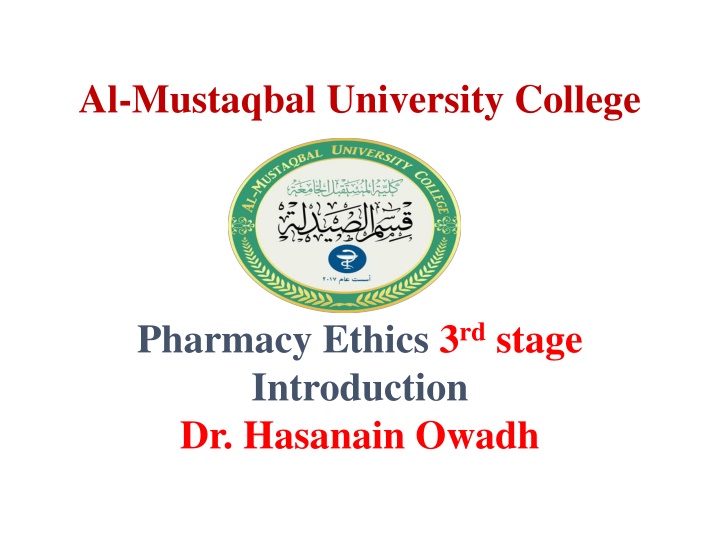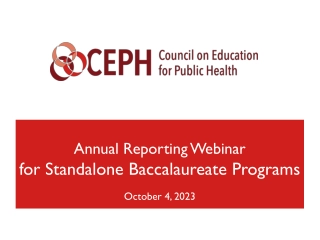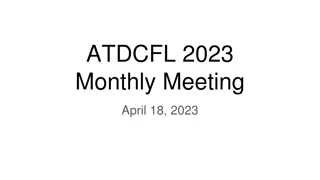
Introduction to Pharmaceutical Ethics and Patient Care
Explore the practical application of ethical standards in pharmaceutical care, emphasizing the importance of recognizing and resolving ethical, legal, and clinical issues. Learn how personal values can impact professional responsibilities and behaviors, and understand the dynamic nature of ethics in the pharmaceutical industry.
Download Presentation

Please find below an Image/Link to download the presentation.
The content on the website is provided AS IS for your information and personal use only. It may not be sold, licensed, or shared on other websites without obtaining consent from the author. If you encounter any issues during the download, it is possible that the publisher has removed the file from their server.
You are allowed to download the files provided on this website for personal or commercial use, subject to the condition that they are used lawfully. All files are the property of their respective owners.
The content on the website is provided AS IS for your information and personal use only. It may not be sold, licensed, or shared on other websites without obtaining consent from the author.
E N D
Presentation Transcript
Al-Mustaqbal University College Pharmacy Ethics 3rdstage Introduction Dr. Hasanain Owadh
Background Pharmaceutical applied ethics in that it consists of the practical application of moral standards to specific ends. care involves Pharmaceutical care practitioners should not only be clinically competent, but must also adhere to the law and ethical standards. The pharmaceutical care practitioner must learn to recognize when his/her personal values (political views, religious beliefs, or social expectations) interfere with professional responsibilities and behaviors. As a general rule, clinical problems should be identified and resolved first, followed by legal issues.
Background Pharmacists are the researchers, developers, producers, people who are trusted to give advice on drugs to all health professionals and persons who market drugs in the whole world. The pharmaceutical industry is the most heavily regulated of all industries. Laws are not static but ethics is static. This means that students, and eventual practitioners, need to remain alert throughout their professional life for changes and amendments to each and to be aware of how these will affect and impact on their chosen area of practice.
Ethics Ethics is the study of the rightness or wrongness of human conduct. Patient care involves applied ethics in that it consists of the practical application of moral standards to specific ends. In pharmaceutical care, utilization of pharmaceuticals should depend on using the essential knowledge that should always accompany such clinical intervention.
Ethics Pharmaceutical care is dependent upon human interactions, that include patients, family members, pharmaceutical care practitioners, other clinicians, support personnel, managers, and administrators. These individuals are likely to have different values, beliefs, and preferences. Whenever two people with different value systems interact, there is the potential for an ethical problem to develop. Because ethical problems are common in practice it is important that practitioners know how to identify and resolve them when they arise.
Ethics There are three issues clinical, legal, and ethical which can be so closely associated. It will be helpful if the three issues can be separated, when possible, because a successful resolution to each issue is arrived at slightly differently. Each situation requires different knowledge for its recognition and a somewhat different process for its resolution. As a general rule, clinical problems should be identified and resolved first, followed by legal issues, and if an ethical problem remains, it can then be resolved effectively.
History The art of pharmacy was first practiced in Ancient Babylon around 2600 BC. In this era the priest, physician and pharmacist was the same person. The Arabs were the first to separate the art of pharmacy from physician and in the eight century they establish the first private pharmacy in Baghdad. When the European countries were exposed to Arabian influence, public pharmacies began to appear. However, it was not until about 1240 AD separated from medicine.
HISTORY 1906 Federal Food and Drug Act Enacted to stop the sale of inaccurately labeled drugs Manufacturers were required to put truthful information on the label before selling the drug Manufacturers had to prove their drug s effectiveness 1914 Harrison Narcotic Act Enacted because of the excessive number of opium addicts in the United States People could no longer obtain opium without a prescription
1938 Food, Drug, and Cosmetic Act Enacted because the earlier Food and Drug Act was not worded strictly enough and did not include cosmetics. Required drug companies to include directions to the consumer regarding use and package inserts on drugs All narcotics were required to be labeled Warning: May be habit- forming 1951 Durham-Humphrey Amendment Required the labeling dispensing without a prescription Caution: Federal law prohibits Made certain drugs require a doctor s order and supervision. Made the initial distinction between legend drugs (by prescription only) and over-the-counter (OTC) medications
1962 Kefauver-Harris Amendment Enacted in an attempt to ensure the safety and effectiveness of all new drugs on the market Burden put on manufacturing companies to have good manufacturing practices GMP Prevented the sale of thalidomide in the United States because children were born with birth defects after usage in pregnancy
ISSUES OF THE LAW Pharmacy law consists of rules, regulations, and actions that are disseminated by governments and are binding on its constituents. Example Should a pharmacist, based on his/her clinical judgment at the time of an emergency, provide a patient with a life-saving drug not authorized by a physician's prescription, when technically he/she is breaking the law, but is perhaps acting ethically? There are many laws that direct what practitioners may and may not do with prescription drug products.
ISSUES OF THE LAW In those relatively few situations where the law is not clear, practitioners should always follow the professional and ethical mandate to do no harm and when it is possible, to do good for the patient. Example is it ethical to intentionally dose a patient with an amount of drug that is so small to has little or no chance of successfully treating the medical problem? If the pharmacist's clinical judgment is that the patient's drug therapy problem is that the dosage is too low, then it is legally necessary to obtain the consent of the prescriber in order to increase the dose. Being an active moral agent can conflict with the law and often does.
LEGISLATION Legislation sets out the rules or structure for what we can do and what we are not allowed to do and outlines the consequences of breaking the rules. Every pharmacist has a duty to practise lawfully and the sanctions for failing to do so can be harsh. The consequences of breaking the rules of professional practice can include criminal prosecution resulting in a fine or, in more serious cases, imprisonment, as well as removal of the right to continue to practise (removal from the register).
PHARMACIST AND LEGISLATION Pharmacists, are required to follow the requirements of the Code of Ethics and other guidance and standards set out by the professional regulator. When applying clinical knowledge in practice, patients and the public will rightly wish to assume that the knowledge will be up to date, relevant and safe. Early legislation relating to pharmacy was concerned with prohibiting harmful practices associated with the supply of medicines and restricting authority to a few types of practitioner. In UK, Pharmacists were all required to achieve a set standard of education, to register with the Royal Pharmaceutical Society of Great Britain and pay an annual retention fee in order to be able to continue to practise.
DEFINITION OF DRUG IN ENGLISH It is listed in the United States Pharmacopoeia/ National Formulary (USP/NF), or the official Homoeopathic Pharmacopoeia of the United States, or any supplement to them. It is intended for use in the diagnosis, cure, mitigation, treatment, or prevention of disease. It is intended to affect the structure or any function of the body.
Foods Vs. Drugs Natural products--Health Foods i.e.., St. Johns Wort to treat depression Sometimes called Nutraceuticals if neither food or drug often lacking evidence of efficacy Medicines and Pharmacies The pharmacist had to be personally available to intervene in every sale or supply of a medicine whether in accordance with a prescription.
Current Good Manufacturing Practice (Gmp) A drug is adulterated unless it is manufactured in accordance with GMP GMP establishes minimum requirements for facilities, manufacturing controls, processing , packaging. Pharmacies are not subject to GMP unless they are manufacturing Rx products for resale to other pharmacies, physicians or retail outlets
References: -Robert J. Pharmaceutical Care Practice: The Clinician's Guide, 2ndEdition. - Internet search.















